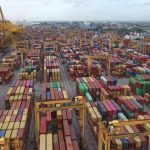With the 15 January target date for a new master agreement between union dock workers and US Gulf and East Coast ports rapidly approaching, the Alliance for Chemical Distribution (ACD) is urging both sides to push back the deadline.
Negotiations between the dockworkers, represented by the International Longshoremen’s Association (ILA), and the ports, represented by the United States Maritime Alliance (USMX), have been stalled as each side is unwilling to budge on issues surrounding automation of ports.
Container ships and costs for shipping containers are relevant to the chemical industry because while most chemicals are liquids and are shipped in tankers, container ships transport polymers, such as polyethylene (PE) and polypropylene (PP), are shipped in pellets.
They also transport liquid chemicals in isotanks.
ACD President and CEO Eric Byer outlined the challenges hindering negotiations and emphasized the significant economic and public consequences of a contract lapse in a letter to both parties.
Byer also highlighted the economic impacts the previous three-day strike caused to various industries and the challenges the chemical distribution industry would face if another strike were to occur.
Other challenges are the 29 January start of the Lunar New Year, and the upcoming inauguration and transition to the new presidential administration.
“In early October, during the three-day lapse in the master contract between the ILA and USMX, there was a substantial economic impact, weeks of supply chain disruptions, and challenges in getting necessary supplies to communities in the wake of the Hurricane Helene disaster,” Byer said in the letter. “Additionally, had the lapse continued for just a few more days, it would have resulted in ACD members losing stock of chemicals used for critical processes, such as water treatment.”
In a 12 December post on social media, President-elect Donald Trump expressed his support for the dockworkers in the labor dispute.
A strike would not have an impact on liquid chemical tankers, which transport most chems.
For most traders and brokers who export polyvinyl chloride (PVC), much of their warehouse space is full and they are unable to book vessels until after the 15 January deadline because of the uncertainty.
“This could make for a very challenging first quarter,” ICIS Senior Analyst Kelly Coutu said.
Source: By Adam Yanelli, ICIS,






